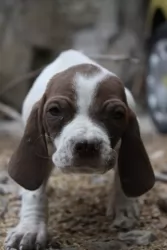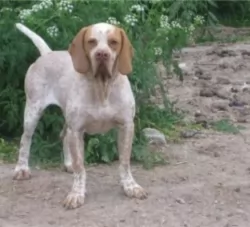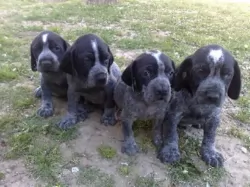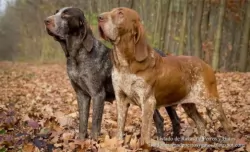 MyDogBreeds
MyDogBreeds Pachon Navarro is originated from Spain but Australian Shepherd is originated from United States. Both Pachon Navarro and Australian Shepherd are having almost same height. Both Pachon Navarro and Australian Shepherd are having almost same weight. Both Pachon Navarro and Australian Shepherd has same life span. Both Pachon Navarro and Australian Shepherd has almost same litter size. Pachon Navarro requires Low maintenance. But Australian Shepherd requires Moderate maintenance
Pachon Navarro is originated from Spain but Australian Shepherd is originated from United States. Both Pachon Navarro and Australian Shepherd are having almost same height. Both Pachon Navarro and Australian Shepherd are having almost same weight. Both Pachon Navarro and Australian Shepherd has same life span. Both Pachon Navarro and Australian Shepherd has almost same litter size. Pachon Navarro requires Low maintenance. But Australian Shepherd requires Moderate maintenance
 Known also as the Navarra Pointer, this is a Spanish hunting dog native to Navarre, Spain and descended from the extinct Old Spanish Pointer.
Known also as the Navarra Pointer, this is a Spanish hunting dog native to Navarre, Spain and descended from the extinct Old Spanish Pointer.
Major kennel clubs don’t recognize this dog as a standardized breed, but the Spanish Kennel Club has accepted the Pachón Navarro as a breed.
It is believed that this dog has also descended from other hounds as well as the Talbot hounds. It isn’t a new breed as it is thought that the dog originated in the 12th century already. There were times when the dog almost became extinct but efforts to preserve it have been made and to also establish it as a standardized breed.
 The Australian Shepherd, known fondly as ‘Aussies’, is actually an American breed, with the first official registry being in the 1950s. Basque Shepherds from Spain settled in Australia at the end of the 19th century, later moving to the United Stated with their dogs in tow. It is from these dogs that the breed originated. In the UK too, this breed of dog has many enthusiastic followers.
The Australian Shepherd, known fondly as ‘Aussies’, is actually an American breed, with the first official registry being in the 1950s. Basque Shepherds from Spain settled in Australia at the end of the 19th century, later moving to the United Stated with their dogs in tow. It is from these dogs that the breed originated. In the UK too, this breed of dog has many enthusiastic followers.
For many years, the Australian Shepherd has been recognized for their wonderful abilities as stock- or herding dogs, and today in Australia they continue to work as stock dogs and often take part in herding trials.
More recently, this working dog breed has been selectively bred to develop both Toy- and Miniature Aussies, and the American Stock Dog Registry actually recognizes 3 sizes today.The Australian Shepherd Club of America was also founded in 1957 to promote the breed.
 This dog is large sized, standing at between 48 and 57cm in height and weighing between 27 and 33kg. A most unusual feature and characteristic unseen in dogs in general is his split or double nose. The nose of the dog serves the same purpose however, as with any other dog.
This dog is large sized, standing at between 48 and 57cm in height and weighing between 27 and 33kg. A most unusual feature and characteristic unseen in dogs in general is his split or double nose. The nose of the dog serves the same purpose however, as with any other dog.
The head is fairly large with a broad forehead. The broad head of the dog is generally solid colored. The coat of the coat of the dog is short and of a hard texture. Colors of the coat are white and brown or white and black or white and an orangey color with ticking.
The eyes are large and brown, the ears are long and broad with a rounded tip and the tail is long too. These dogs have a strong, sturdy body with strong legs.
The Pachon Navarro is a friendly, social, intelligent, loving and loyal dog. He is also gentle and docile with an amicable nature, making him a splendid choice for those with children in the home as well as pets.
He is athletic and energetic and is going to need a good dose of daily exercise. Apart from their strong hunting instincts, they make excellent family pets and companions and is most certainly not a dog to be put outdoors day after day without the contact of his human family.
He is intelligent and a quick learner and will benefit from training and socialization as this makes him obedient and it also bring about positive changes with any bad behavior from this excellent pet.
He requires a kind, firm, patient and consistent owner. This particular dog won’t be suited to living in a tiny property in the city, as they require a lot of space to run and exercise.
 Similar in appearance to the Border Collie, the Australian Shepherd is a medium sized dog and has a medium length coat which is straight to wavy with a weather resistant undercoat. The range of coat colours is amazing, and you’ll find blue, blue merle, black and red merle and all of these are with or without tan points. The Australian Shepherd is a drop-eared breed where prick ears are sometimes seen. Some Aussies are born with naturally bobbed tails while most have full, long tails.
Similar in appearance to the Border Collie, the Australian Shepherd is a medium sized dog and has a medium length coat which is straight to wavy with a weather resistant undercoat. The range of coat colours is amazing, and you’ll find blue, blue merle, black and red merle and all of these are with or without tan points. The Australian Shepherd is a drop-eared breed where prick ears are sometimes seen. Some Aussies are born with naturally bobbed tails while most have full, long tails.
There is variety in the eye colour too, and they are often heterochromatic, which means that they can have two different coloured eyes or the one eye can even be bi-coloured. Most times the eyes are brown, but they can be blue too.
 The Pachón Navarro is an active, friendly, playful, affectionate dog and he makes a great family pet. He will however want lots of outdoor exercise, making him a suitable companion for active owners. Inactive city dwellers should think of keeping a more docile kind of indoor pet.
The Pachón Navarro is an active, friendly, playful, affectionate dog and he makes a great family pet. He will however want lots of outdoor exercise, making him a suitable companion for active owners. Inactive city dwellers should think of keeping a more docile kind of indoor pet.
Your Pachón Navarro just loves the company of his human family and will be dejected if made to spend all his time outside and away from his owner.
He also takes his role as guardian and protector seriously. Give him what he requires and make him part of the family and he will be a most remarkable friend and companion.
 The Australian Shepherd is an intelligent dog, learning quickly. As a herding dog, he also has strong guarding instincts and will make a good watch dog. The dog has a balanced, even disposition, and even though he may show some reserve, he is certainly not a shy dog and isn’t aggressive.
The Australian Shepherd is an intelligent dog, learning quickly. As a herding dog, he also has strong guarding instincts and will make a good watch dog. The dog has a balanced, even disposition, and even though he may show some reserve, he is certainly not a shy dog and isn’t aggressive.
Your Aussie is a kind, loving, and devoted pet. He loves his human family and wants to spend lots of time with them. Don’t leave him without human companionship as he craves it and forms strong bonds with his family. Provide him with good care and with lots of fun and games and you’ve got an exceptional friend for life.
 Pachon Navarros are generally healthy dogs and you’re not likely to spend much time at the vets with these dogs. They can reach up to 15 years of age if looked after well, but with the long ears they are prone to ear infections.
Pachon Navarros are generally healthy dogs and you’re not likely to spend much time at the vets with these dogs. They can reach up to 15 years of age if looked after well, but with the long ears they are prone to ear infections.
Moisture, wax and dirt can all build up inside the dog's ears and this can cause a painful ear infection with the dog scratching and pawing at his ear.
Bloat is another illness to look out for and you'll notice your dog is lethargic and has a swollen, hard stomach with gas being trapped inside. The condition is life threatening and will require a trip to the vet.
 Aussies are a healthy breed and won’t cost you a fortune at the vet. However, like every other breed, they are also prone to certain health conditions such as cancer. When choosing a puppy, always look for a good, reputable breeder who can show you health clearances.
Aussies are a healthy breed and won’t cost you a fortune at the vet. However, like every other breed, they are also prone to certain health conditions such as cancer. When choosing a puppy, always look for a good, reputable breeder who can show you health clearances.
This is a dog ailment that can be inherited. It is where the femur doesn't fit properly into the pelvic socket of the hip joint. Also, as the dog ages, arthritis can develop.
Epilepsy an hereditary disorder where the seizures your dog gets can be treated and controlled.
Osteochondrosis Dissecans, commonly known as OCD is an orthopedic condition which comes about because of improper growth of cartilage in the joints. It can cause painful stiffening of the elbow joint for instance.
Progressive Retinal Atrophy or PRA is a degenerative eye disorder that can finally lead to blindness. Reputable Aussie dog breeders have their dogs' eyes certified regularly by a veterinary ophthalmologist.
Your newborn Australian Shepherd may well be strong and healthy, but he isn’t immune from life-threatening illnesses. Vaccinations are imperative for your Aussie puppy, with vets usually recommending that puppies be vaccinated for the first time from 6 to 8 weeks of age.
These vaccinations will include the 5-in-one and includes Parvovirus, Distemper, Hepatitis and Parainfluenza. Later on the puppy will get his first rabies shot and he will also require booster vaccinations.
 Your Pachon Navarros is a low maintenance dog and you will just be required to give him a good brush. He is a moderate shedder and this brushing down will keep the skin and coat healthy.
Your Pachon Navarros is a low maintenance dog and you will just be required to give him a good brush. He is a moderate shedder and this brushing down will keep the skin and coat healthy.
Because of his long, floppy ears, you will need to check inside them because moisture, dirt and wax can build up and encourage an ear infection. Don’t try to clean inside your pet’s ears if you’re not sure how, rather find out about cleaning the ears from the vet.
The nails will also need to be clipped as well as checking regularly on the eyes and teeth.
Your Pachon Navarro is a hardworking dog and you want to ensure tasty, palatable food that is properly digested and eliminated without problems. If you feed your dog a commercially manufactured dog food, choose the best quality and check out the labels.
Make sure that the food doesn’t contain lots of preservatives, colorants and fillers. Some of the best kibble has the right balance of vitamins and minerals in them. With these kind of hunting dogs, it is best to feed your dog hours before vigorous exercise such as a hunt.
Try and vary the regular kibble by adding in simple, but tasty home-made food occasionally. Dogs appreciate simple food without spices and exotic ingredients as its keeps their stomachs free from pain, gas and bloat.
Some chopped up boiled chicken, some brown rice or pasta and some vegetables such as sweet potato, carrots and spinach is super healthy for your pet as well as adding in a little bit of raw meat from time to time.
Remember clean, fresh water must be constantly available.
 With his medium length coat, the Australian Shepherd sheds. In fact this particular breed sheds his hair the entire year round, but you’ll notice that with the arrival of Spring, he sheds more as this is when he is losing his Winter coat. You will most certainly need to brush his coat at least 2x a week to get rid of all those tufts of hair and to also prevent matting.
With his medium length coat, the Australian Shepherd sheds. In fact this particular breed sheds his hair the entire year round, but you’ll notice that with the arrival of Spring, he sheds more as this is when he is losing his Winter coat. You will most certainly need to brush his coat at least 2x a week to get rid of all those tufts of hair and to also prevent matting.
A puppy will need 4 bowls of vet-recommended food a day. How much your adult Australian Shepherd gets will depend on his age, size and activity levels.The quality of food you buy will make a difference as it will keep your Aussie in good shape. Remember to include raw or cooked meat into his diet once a week or so. For more on feeding your Aussie, speak to your vet. Always ensure a constant source of fresh, cool water.
The Australian Shepherd is a strong willed dog, used to playing the dominant role with the herding of livestock. He’ll need firm training and socialization if you want to make him an amicable family pet.
Like many herding dogs, Australian Shepherds are loyal to their family and don’t easily take to strangers. Aussies make awesome companions for families with kids who have been taught how to treat dogs and other pets with kindness and gentleness. Just like a dog needs socialization, a child needs to respect a sleeping, feeding dog and to leave him in peace.